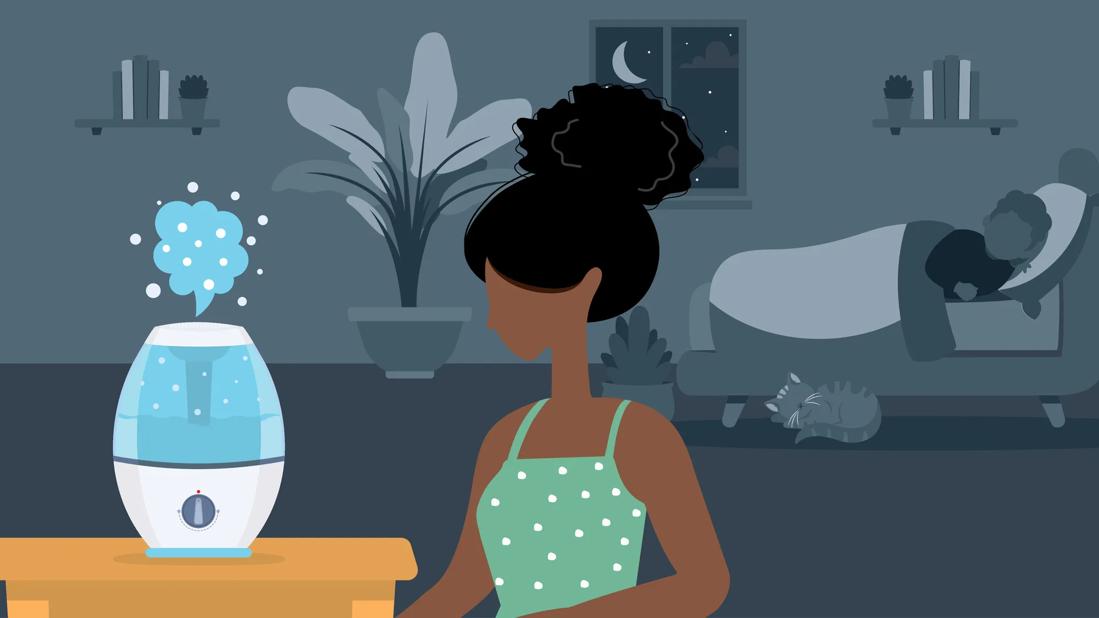Used correctly, a humidifier can help with nose bleeds, allergies, dry skin, sleep quality and more

Static in your hair and sparks flying when you touch things are sure signs that the air in your house is too dry. And an arid home can negatively affect your health.
Advertisement
Cleveland Clinic is a non-profit academic medical center. Advertising on our site helps support our mission. We do not endorse non-Cleveland Clinic products or services. Policy
“When the air is dry, your respiratory system just isn’t happy,” shares pulmonologist Sobia Farooq, MD. “Even if you have no medical problems at all, you can feel the effects. Your skin and nasal passages get dry — all the way down to your lungs.”
But are humidifiers the solution? Oftentimes, the answer is yes. Dr. Farooq highlights their health benefits. She also shares essential tips on proper care and maintenance to ensure safe and effective use.
“Dry air can irritate your nose and lungs, potentially aggravating existing conditions,” Dr. Farooq explains. “A humidifier is one of the best ways to improve indoor air quality and support better breathing.”
She emphasizes that everyone can benefit from having a humidifier at home.
“Think of humidifiers as a preventive measure,” she states. “When the air lacks proper humidity, it becomes uncomfortable. Investing in a humidifier is an investment in your health. If you use one — and use it correctly — you’ll notice the difference and feel better.”
Here’s a breakdown of the most common types of humidifiers:
Advertisement
They’re not complicated machines, but humidifiers can seriously improve your life … and even your living space. That’s right! They’re even good for your furniture!
Dr. Farooq explains the health benefits of using a humidifier.
Keeping your upper respiratory tract properly moisturized can help it function more smoothly. A humidifier also helps thin mucus, making coughing or blowing your nose more effective.
Adding moisture to the air can soothe irritation and reduce inflammation in your airways, helping them become less reactive. But it’s important to maintain indoor humidity below 50%. Also, ensure your humidifier is kept clean to avoid potential issues. (More on that in a bit.)
Running a humidifier at night can help promote restful sleep in several ways.
When your airways are dried out, you’re more likely to snore. You’re also at a greater risk of waking up coughing or having your sleep interrupted by unpleasant symptoms like nosebleeds and dry mouth.
When the air has just the right amount of moisture content, Dr. Farooq says that it makes a difference you can see. Your skin is less likely to crack, itch and chap during the cold winter months.
Upping the humidity can make your hair similarly resilient, reducing split ends and static, improving texture, taming frizz and upping the shine factor. Some people even find that it makes their hair care products more effective.
And let’s not forget about your fingernails and toenails. During the wintertime, they can become dry and brittle. Using a humidifier can improve their strength, thickness and flexibility.
The U.S. Environmental Protection Agency (EPA) recommends keeping your home’s humidity level between 30% and 50%. So, plan to run a humidifier whenever your household falls below that metric.
How often you run a humidifier depends on many factors, including:
Your best bet: Check the operating instructions for your humidifier. You may need to run yours for as little as two hours. But some units are most effective when they run for 10 or 12 hours.
If you enjoy aromatherapy, you may be wondering if you can add a few drops of fragrance to your humidifier.
The (unsatisfying) answer is: It depends. But it’s usually not a good idea!
To be safe, check the manufacturer’s instructions before adding anything to the water in your humidifier. And keep the following out of the reservoir:
Advertisement
You need to keep tabs on your humidifier to ensure it’s clean and in proper working order, Dr. Farooq says. Here are some basic rules to ensure your humidifier works for you, not against you:
Advertisement
If you have any concerns that your humidifier could be negatively impacting your health — especially your respiratory health — Dr. Farooq urges you to stop using it and contact a provider.
Advertisement
Learn more about our editorial process.
Advertisement

Stretch before heading outside, keep proper form and avoid jerking or twisting to throw snow

If the flakes are undisturbed, pristine white and come from the top layer, it’s typically safe to indulge in a scoop

Bottom line? Dress warm, be careful and plan ahead to get the most out of the season

Sneak in exercise when you can, pack your own lunch and make time for mental health

Taking slow, short steps and wearing proper footwear can go a long way in preventing falls

With planning and precautions, you may be able to keep winter health issues at bay

An ER doc shares tips for being careful while having fun

Some heat escapes if you don’t wear a hat, but it’s not as much as you might think

Wearing a scarf, adjusting your outdoor activities and following your asthma treatment plan can help limit breathing problems

Your diet in the weeks, days and hours ahead of your race can power you to the finish line

When someone guilt trips you, they’re using emotionally manipulative behavior to try to get you to act a certain way